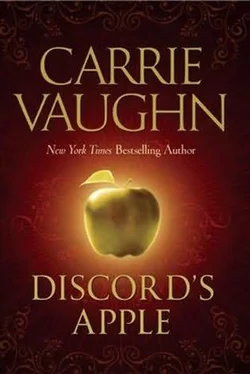“Arthur!”
Merlin tugged the warrior’s arm. Arthur laughed, spun, ducked through the doorway into the Storeroom—and disappeared.
The wizard offered a brief salute to Hera and followed him. A light sparked around the doorway and was still, and the door was just a door, leading to a room in the process of being ravaged by a tornado.
She saw no sign at all of Evie Walker and the Greek.
She finished the walk from the stairs to the door of the Storeroom. The ceiling was gone now; the walls were following, and the contents of the room—shelves of artifacts, boxes and bags, spears and swords, cabinets of gowns, crowns, golden balls, ancient horns, lyres, flutes, and bones—spun up and away, caught in the whirlwind, and disappeared. All that magic, flying back into the world, scattering, and the cycle would begin again, the stories would begin again.
She raised her hands and laughed as notebook paper covered in writing fluttered around her.
F amily, loyalty, duty. The stories his father told named these as the greatest attributes a man could have. All honor came from the way one behaved toward one’s family, friends, and comrades in arms. Abstract virtues were all well and good, but they could be twisted to serve unworthy ends or unscrupulous people. One marked the greatness of a man not by the crown upon his head, but by his actions.
Telemachus didn’t know his father until he was full grown. He didn’t hear these stories until he was a man with children of his own, and Odysseus told them to his grandchildren. But Telemachus knew the lessons because he had grown up with a symbol of them more powerful than any story Odysseus told: his mother, Penelope, at her loom. Her loyalty to Odysseus never wavered. Watching her, Telemachus learned of family, loyalty, and duty.
Telemachus never thought of having adventures of his own. His father’s adventures were so famous, how could the son ever match them? He would be content to stay at home and have the quiet life his father had missed.
He forgot, though, that Odysseus hadn’t asked for his adventures, and one day a stranger came to his door.
Sinon had thought Prometheus would open an enchanted doorway, and they would step through to the land of Ithaca in an instant. But he didn’t. They took a boat.
As Sinon stepped onto the shore of the island of Ithaca, he wrapped the edge of his cloak over his shoulder against the chill autumn breeze coming off the water.
“How long has it been since you’ve been back?” the man—man?—beside him asked.
“I set sail with Odysseus. Ten years before the fall of Troy.” That was how he marked time now. Before the fall of Troy, and after.
“Has it changed much?”
“I don’t know.”
It hadn’t changed, at least at first glance. Time played tricks, and he was a young man again, waiting to go to war. He expected to recognize faces in the village. He thought he did, almost. But he looked again, and saw that there were more houses, in different places. The fishing huts he had expected to see farther up the beach were gone. A stone wall separated the beach from the town. That hadn’t been there before. Many people worked and traveled on the path leading from the dock, all of them strangers. The island had prospered. And why not, when Odysseus had led them all these years?
“Are you coming?”
He shouldn’t. What would he say when he got there? “Yes.”
He still knew the way to Odysseus’s manor. He led Prometheus there.
It, too, seemed the same: a stucco wall surrounded the house, but the wooden gate stood wide open, welcoming visitors. Chickens scratched in the dirt, children played with dogs, women worked in the yard spinning wool and hanging wash to dry. Odysseus had lands with tenants, servants and wealth. He was as much a king as Agamemnon had ever been, though unlike Agamemnon, Odysseus had never cared for crowns or displays of power.
Sinon stood at the gate for a long time, hugging himself under his cloak. Prometheus waited for him, and Sinon was about to give in to his second thoughts and turn around, when a boy almost grown, fifteen or sixteen years old, came around the corner and leaned on the wall. He had dark shoulder-length hair and a proud tilt to his chin.
“Sirs, are you needing shelter?”
I know that face, Sinon thought. He glanced away to hide his look of wonder.
Prometheus had to speak for them. “I was told in the village that this house is famous for its hospitality.”
The boy beamed, his smile lighting his face. “It is! That is, if the guests are polite. This is the house of Odysseus, my grandfather. Have you heard of Odysseus?”
“Of course I have. His tales are famous from one end of the Mediterranean to the other.”
“I’ll go get my father. Come in!” The boy stepped between them, took them by their elbows, and pulled them into the yard. Then he ran off behind the house.
“Friendly lad,” Prometheus said with a grin.
Sinon studied the house and its yard, the work going on, every face that eyed him curiously and gave him a smile. This was the life he might have had. A wife and children. A farm. Laughter.
He couldn’t go back.
A moment later, the boy returned, running ahead of a slim man of middle age. He had gray in his dark hair and beard, but his expression was bright, his body strong, and his long stride almost kept up with the boy’s enthusiasm.
“Father, here are the strangers!” the boy said proudly, as if he had found treasure.
The older man smiled and came forward. “Give me your arms, strangers, and rest with us awhile. I am Telemachus. This is my youngest son, Polymedes.”
Prometheus offered his hand, and the men gripped each other’s wrists. Telemachus repeated the gesture with Sinon.
Sinon said, “Son of Odysseus. I am honored to meet you.” He had his father’s eyes. Gods, Odysseus must be so proud of him. “I am—Call me Phaetus.”
“And I am Inachus,” said Prometheus.
“Welcome. Come in and take rest.”
The boy Polymedes ran ahead, and Sinon asked, “How many children do you have?”
“Ten, may the gods help me.” He laughed.
Telemachus guided them inside and brought food and drink while they sat at a table near the hearth. The household gathered for the evening meal, and everyone treated them as honored guests. Prometheus sat at Telemachus’s right hand, Sinon sat beside Prometheus, and they listened to the stories of the day: of cats that caught mice, of a child learning to walk, of a fisherman’s son courting a daughter of the household.
Sinon knew what he looked like—a strapping warrior of perhaps thirty years of age, a little worn by travel, but at his prime. Certainly not old enough to have seen Troy fall. Telemachus would think himself a good twenty or thirty years older. Sinon tried to remember that, and when his host asked questions about where he came from and what he did with himself, he tried to make appropriate answers—answers that weren’t lies and yet hid the truth. I’ve worked as a sailor. We fought off pirates once. Prometheus spoke little, watching the proceedings with a pleased smile.
Before the meal was served, Polymedes and a maiden a year or two older than he entered, between them guiding an ancient man stooped with age, his hair thinned to wisps. Before thinking, Sinon stood, leaning on the table to steady himself. He had prepared himself for this sight. Nonetheless, he wasn’t ready for it.
Telemachus leaned over to whisper to Prometheus and Sinon.
“The storytellers call him Many-Minded. I must warn you: Age has taken most of those minds from him. My mother’s death last year nearly destroyed him. But I still honor him as head of this household. At least in spirit.” He moved to take his son’s place by the old man’s side and helped guide him to the head of the table.
Читать дальше












